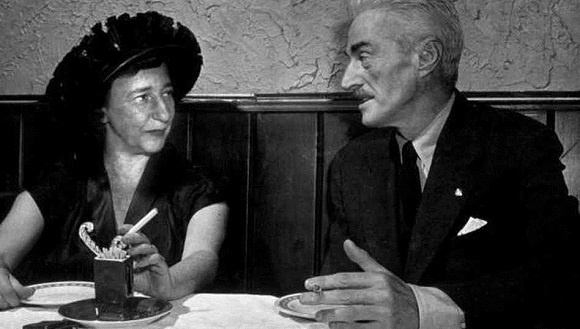A Romantic, Literary Tug of War: Dashiell Hammett and Lillian Hellman
By Sam Toperoff

Dashiell Hammett and Lillian Hellman © George Karger
Editor's Note: Sam Toperoff's new novel Lillian and Dash reimagines the shared love and labors between famed crime novelist Dashiell Hammett and the equally acclaimed playwright Lillian Hellman. Harnessing the idea that all authors are reluctantly hounded by their own competitive drive, Sam revisits the couple's tumultuous relationship, defined as much by respect and encouragement as it was by jealousy and judgement.
Outside of their own impassioned world, a series of political events -- the Spanish Civil War, World Word II, McCarthyism -- likewise swept them up in a whirlwind of change, and Sam does well to explain how the troubled couple's creative pursuits were tossed in new directions. Here we've asked Sam to shed some light on the real lives of the literary figures who inspired his fast-paced, high-spirited counterfactual history, recounting two burning minds that brightened the twentieth century.
As a writer who doesn't really know many other writers well, the true nature of the writer’s life has long interested me. How, why and even when writers work fascinate me, so I knew in some vague way that I wanted to try a novel about a writer. Then, purely by chance, I happened on an old “Sam Spade” radio script by Dashiell Hammett, one I remembered hearing as a boy. Maybe Hammett could be the writer I was looking for. I ordered a volume of his letters and discovered that his discussions on the subject of writing with Lillian Hellman were tremendously interesting. Why not explore the intertwined lives of two great American writers?
Hammett and Hellman first met at a Hollywood party in the 1930s. Dash was already famous for The Maltese Falcon and making very good money writing for the movies. Lillian, twelve years younger, was a literary wannabe. Hammett became her mentor, experienced and wise, but very demanding. They were quickly in love but in a special, complicated way: their sex was dramatic and compelling but each was married to someone else. They also both drank a great deal. He was a lapsed Catholic, she a Jewish maideleh. But when they worked as writers on their movie scripts, novels and plays, they really worked.
Lilly followed Dash’s writing regimen closely and soon had a great success with The Children’s Hour, a Broadway play about an ambiguous lesbian relationship. Hellman bounced from success to success while Hammett began to succumb to easy Hollywood money, careless work, and binge-styled alcoholism. Emotionally torn by her success -- on the one hand pleased by her achievements, on the other jealous as hell -- Hammett began to realize that he no longer practiced what he once preached about writing. They had become a literary Yin and Yang -- as she waxed, he waned.
There is a deeply competitive element in all writers’ lives, I think. They compete against other writers for readers and for approval in general, not to mention competition against themselves, in an attempt to transcend their own work. In the case of two writers like Hammett and Hellman living together much of the time, competition can and did reach destructive proportions. It became impossible for them to remain together for any substantial length of time.
Hellman always considered Hammett the master writer, a painful position for a realist who knew the reality of the situation -- he had all but burnt out while she was becoming everything he wished for her and really aspired to himself. Still, she never stopped believing he could write “the great American novel,” and never stopped urging him to do so. He was certain he never had it in him in the first place and that she was the true artist. Lilly’s expectations were the reason Dash pushed her away so often.
Always, however, over a thirty year period, they never stopped loving one another completely. Their love held because of their great respect for one another, and often because of their mutual need. In Dash’s decline, only Lillian knew what he needed and how to take care of him. He had been her support and encouragement at the start. She repaid him in kind at the end. But, oh, what a pair they were when they were both on top of their game!
